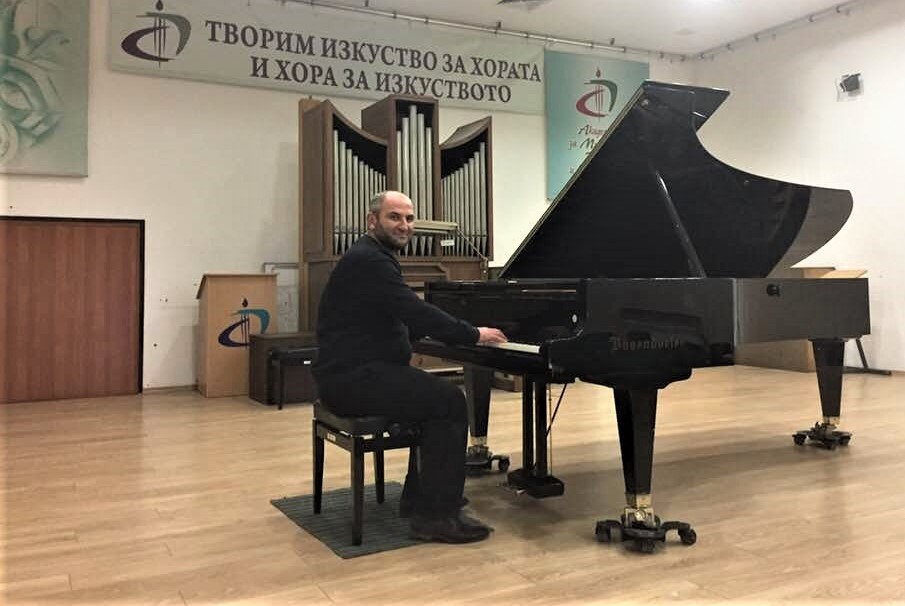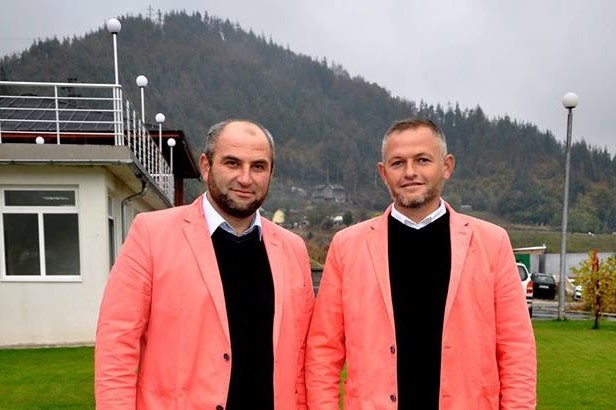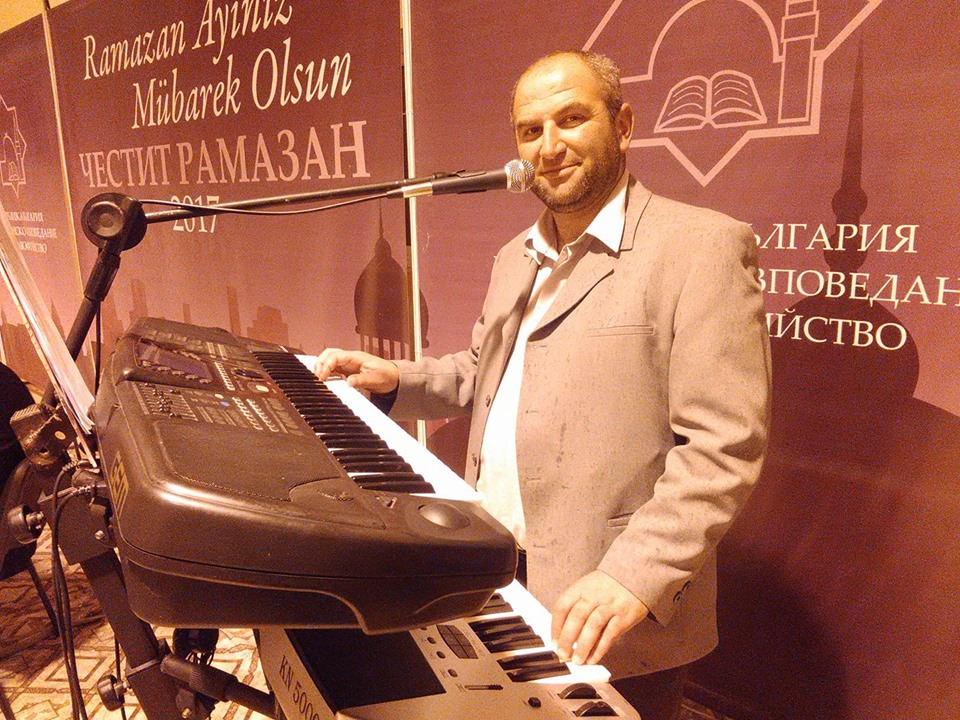News

Between melodies in religion and dissonances in their interpretation – frankly with Nihat Ademov
19 August 2019Between melodies in religion and dissonances in their interpretation – frankly with Nihat Ademov
Nihat Ademov
The topic about music in Islam has been an occasion for a number of polemics over the time. In the modern society the opinions are polarized as well. Many people state that it is “haram” (forbidden) and for them the phrase “religious music” is an absolute oxymoron. Yet others have found exactly in music a way to attract young people to religion, putting a deep sense in their lyrics. And they are making this in time, characterized by a deep crisis of values. They have been doing this for already 15 years.
Main initiator of this is Nihat Ademov from the village of Vitina, Rudozem region. Nihat Ademov graduated at the religious school in Momchilgrad. He acknowledges that exactly there the idea for creating religious music in Bulgarian language came to him for a first time. Before that the songs were mainly in Arabic and Turkish.Soon after that exactly he was the person who breaks the common ideas and the tradition by founding “Vest” band, which later turned into “Studio Vest”. Over the recent 18 years he has been working as an imam, and the activities in the field of music fill his spare time. Feeling how complex the matter of music is he decided to fill in the gaps and to enroll in musical education. Recently he graduated from the University of Plovdiv, “Pedagogics for Education in Music” specialty, and then in AMDFA – Plovdiv he acquired also further training in “Music Therapy”.
For the 15 years of the existence of the band, for the messages of the songs of “Vest” band, as well as about the controversies and the disputes which their music causes – speaks Nihat Ademov.
“Vest” has been existing already for 15 years – how did you decide to record such kind of music, how many albums did you release during this period, in what composition you are working?
Music indisputably exists in our daily life. During the work with children in the mosque I have noticed that they are massively with headphones. So 15 years ago together with my fellow- we discussed the idea for an innovative religious education, introduction into religion through music. We did some songs and it appeared that the youths liked them. And in this way we have released so far 9 albums in Bulgarian and one experimental album in Turkish with our translated songs. This appeared during the process of our work. We have many invitations for participation in religious programs so that we decided to translate some of our songs and to collect them in an album. The last album was released in 2018, we are currently preparing a new one and we have already recorded four songs.
The composition of the formation has changed over the years. At present we participate at the various programs with imam Vahdi Delihusev. We intend to engage also young people for some of the performances in the new album.

Nihat Ademov and Vahdi Delihusev
What do you sing about, what are the main topics and messages in your music?
We focus on morality, on attitude towards relatives, respect for parents, disadvantaged people. We aim to make people know the Almighty and the messengers. We are trying to be innovative, to attract people through melodies from the modern styles that are liked and to reach in this way to their hearts. Music exists in our daily life and everyone listens, but listening to our music he can touch the religion deeper in an understandable language.
Where do you present your repertoire most often?
Mostly at cultural and religious celebrations and weddings. We go most often in the region of Velingrad, Gotse Delchev, we were also invited in Xanthi several times to sing at religious weddings. Furthermore, we will participate for a second time in one forum – “Diversity in Religions”, which is organized by Sofia Municipality. Once we took part in it three years ago and now are again have an invitation by Grand Mufti’s Office to represent our community at this event, in which participate all religious communities in the country. It takes place in the middle of September.
There are a lot of disagreements whether your music is allowed from a religious point of view.
In religion there are disagreements about almost everything. Yes, you are right that the opinions about our music are polarized. Some scholars say that it is haram, others – halal. I can tell you which are based on what because I have also investigated this topic. Those who deny this kind of music quote part of the Qur’an which says: “And buy the amusement of speech to mislead [others] from the way of Allah”. But in most of the cases is recited the first part of this verse and it is focused on buying. But there are others who say that it is not haram, because the texts are meaningful and teach virtues.
Indisputably music affects psychologically and also in any other aspect. Music also has basics and it has its theory. All these things are studied, in the same way in which the basics of religion, in this case the basics of Islam, are studied. We cannot say about science that is haram. And music is a kind of science, isn’t it? And a rather complex science. I do not know how one can so easily say that something is haram, to deny it. But in many cases we deny things which we do not understand.
Others say that musical instruments are haram. This in a pure historical plan is unfounded. The piano for example became popular in 18th century, i.e. it did not exist during the time of the last messenger. After all I can say that we are living in free times and everyone is free to follow what makes him calm. And I am calm with this, with what I do, I have investigated the topic and I can say that I have no warries that it is almost like I am involving people into sin with my activities.
I notice on the social networks that you are also criticized that people are listening only to the melody instead of focusing on the messages of the lyrics?
There is such criticism, you are right. But I will tell you why I have chosen the melody to prevail in most of the songs. We live in the Balkans and there is such a great diversity here. We include in our performances also Arabic motifs and elements. Many people also say that there should be no melody but only a light background, even without rhythm. It is very easy in this way, even elementary, but my opinion is that there must be diversity and emphasis on modern styles. And if one wants to reflect on the lyrics the melody will not prevent him.
How you will respond to the opinions that many people are spending their time inefficiently, listening to Islamic music, instead of listening to lectures, ahadith (narrations of the Prophet pbuh), reading the Qur’an, etc.?
Something which teaches you cannot be called a waste of time. On the one hand, music has a relaxing effect, and on the other hand – instructive. Everyone understands religion differently. We again come to the different points of view. Practice and time show that those who are devoted only to lectures and ahadith could not find after that the balance in life. Psychological disorders are unlocked. And the purpose of religion is not this. The purpose of religion and its main message is the person to be happy and to find the balance. How will you be happy if you do not know God, if you do not follow His instructions?! The One who created you knows best what will make you happy through His message – the Qur’an. The Qur’an contains the rules of life. And it says nowhere that you have to listen to lectures and ahadith all the day. The Muslim is ordered to perform the 5-time prayer. Other recommendations are: “And remember Allah often”, i.e. do not forget Him. “And when it is time for the prayer – go, and when the prayer has been concluded, disperse within the land and seek from the bounty of Allah”. I can say it also in other words – people who are far from religion, always go to extremes. I would recommend people to read the Qur’an, and not the lecture. Because lectures are interpretations and everyone interprets according to his level of knowledge. Everyone presents his point of view. You cannot say that the lecturer speaks on behalf of Allah. Allah speaks only through the Qur’an.
And how do you respond to those who do not like your music, who deny it?
There was a time when I made a lot of efforts to dissuade them. But the time learnt me not to fall for provocations. I could recommend them to read certain things. I am fully aware that this will not change for one day. The generation of my grandfather was singing these songs in Turkish. No one had ever thought about Bulgarian versions. And this understanding existed until recently, that it should be spoken only in Turkish or Arabic in the mosques, even the Friday sermons till few years ago were delivered in Turkish or Arabic language. Fortunately, already in all central mosques Bulgarian language is used.
And where does this courage in you come from?
The sparks were lit still in 9th grade, when I was in Momchilgrad. There was one boy who played synthesizer. When I was a child I learned to play the accordion few melodies and I tried to play them on the synthesizer. In this very moment I became fond of it. There was also one teacher who mentioned the idea that someone of us can finally translate these Turkish songs into Bulgarian language. I decided to try, though after some time.

During participation in a Ramadan program of grand Mufti’s Office
And what are your future plans?
I have ideas, I wish that we could engage more young people, but I understand how complicated is their daily life. The educational process is very busy. But I think that whatever art the children do it is something positive for them because on the one hand it develops their consciousness, and on the other hand – they avoid swinging towards vices. Actually we had some projects with Grand Mufti’s Office exactly in this direction but unfortunately we did not have support. But we have been invited by the mufti’s office at many of their event, for which we are grateful.
I wish that more young musicians with instruments could join the band. To enlarge its composition. To engage young people as well. Anyway I had the opportunity to work as a substitute teacher in music. I intend to continue my work in this field also in the future. Music has accompanied me all of my life. But the university gave me another view, it changed my outlook.
Author: Natalia Kehayova - Mollova
Source: Rudozemdnes.bg